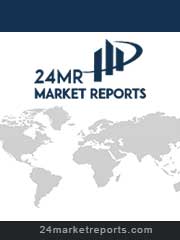
Download FREE Report Sample
Download Free sample
MARKET INSIGHTS
Global recreational CBD beverages market size was valued at USD 15.3 million in 2024. The market is projected to grow from USD 20.2 million in 2025 to USD 108 million by 2032, exhibiting a CAGR of 33.0% during the forecast period.
Recreational CBD beverages are drinks infused with cannabidiol (CBD), the non-psychoactive compound derived from hemp plants. These beverages encompass various product types including CBD-infused coffee, tea, sparkling waters, and functional drinks, designed to offer relaxation benefits without the intoxicating effects of THC.
The market is experiencing exponential growth due to shifting consumer preferences toward wellness-oriented products and increasing legalization of hemp-derived CBD products. North America currently dominates the market, accounting for over 60% of global sales in 2024, while Europe shows the fastest growth potential with its evolving regulatory framework. Major beverage companies like Heineken and Molson Coors Brewing have entered the space through strategic partnerships, validating the market's commercial viability.
Rising Consumer Shift Toward Functional Beverages to Drive Market Expansion
The global recreational CBD beverages market is experiencing robust growth, primarily fueled by the increasing consumer preference for functional beverages that offer health benefits beyond basic nutrition. The market, valued at $15.3 million in 2024, is projected to grow at a remarkable CAGR of 33.0% through 2032. This growth trajectory stems from CBD's recognized potential in stress relief, anxiety reduction, and sleep improvement - benefits that resonate strongly with today's health-conscious consumers. Beverage manufacturers are capitalizing on this trend by infusing CBD into popular drink formats like sparkling waters, teas, and coffees, effectively bridging the gap between recreation and wellness.
Regulatory Advancements and Legalization Momentum Create Favorable Environment
To know more about market statistics, Download a FREE Sample copy
The gradual but steady legalization of hemp-derived CBD products across multiple jurisdictions has created a conducive environment for market expansion. While the 2018 Farm Bill marked a turning point in the United States by legalizing hemp-derived CBD at the federal level, recent years have seen more precise regulatory frameworks emerge. Several states have established clear guidelines for CBD-infused food and beverages, giving manufacturers the confidence to innovate and scale production. This regulatory clarity has proven particularly important as the industry moves beyond hemp waters into more sophisticated beverage formulations with precise dosing and enhanced bioavailability.
➤ In 2023 alone, over 200 new CBD beverage SKUs entered the U.S. market, reflecting both growing consumer demand and manufacturer confidence in the category's longevity.
Furthermore, the increasing partnership between beverage alcohol companies and cannabis producers signals market maturation, as seen in collaborations like Molson Coors' joint venture with HEXO Corp. Such strategic alliances are accelerating product innovation and distribution reach in the recreational CBD space.
Regulatory Ambiguity and Compliance Costs Continue to Dampen Growth
Despite progress in some regions, inconsistent regulations across markets present significant barriers to the recreational CBD beverages industry. The U.S. FDA's ongoing deliberations about CBD's classification as a food additive have created uncertainty, forcing manufacturers to navigate a complex patchwork of state-level regulations. This fragmentation increases compliance costs and limits national distribution strategies for many brands. In international markets, the regulatory landscape varies even more dramatically, with some countries maintaining strict prohibitions on CBD-infused products despite growing consumer interest.
Other Constraints
Supply Chain Complexities
The CBD beverage sector faces unique supply chain challenges, from ensuring consistent cannabinoid potency across batches to maintaining product stability throughout distribution. These technical hurdles require significant investment in formulation expertise and quality control systems that many emerging brands struggle to implement effectively.
Consumer Education Deficits
Misconceptions about CBD's psychoactive properties and inconsistent product labeling have led to consumer confusion that continues to hinder mainstream adoption. Many potential consumers remain unaware of key differentiators between CBD and THC, or the varying effects of different cannabinoid formulations.
Premiumization and Flavor Innovation Present Significant Growth Potential
The recreational CBD beverage market is ripe for premiumization, with opportunities to develop higher-margin products targeting specific consumer occasions and need states. Early success with CBD-infused sparkling waters has paved the way for more sophisticated offerings, including craft-style CBD tonics, functional mocktails, and performance recovery drinks. The emergence of nano-emulsified CBD formulations - which significantly improve bioavailability and onset time - allows brands to create more efficacious products with clear points of differentiation. This technological advancement dovetails with consumer demand for products that deliver tangible, predictable effects.
Expansion Into New Distribution Channels Accelerates Market Access
The gradual normalization of CBD products has opened doors to mainstream retail channels that were previously inaccessible. Major convenience store chains and grocery retailers are increasingly adding CBD beverages to their wellness sections, while specialty coffee shops and bars are experimenting with CBD-infused drink menus. This channel expansion coincides with the development of more stable formulations that can withstand variable storage conditions - a critical factor for widespread retail distribution. The online channel continues to show particular promise, with DTC CBD beverage sales growing at approximately 40% annually as consumers seek out specialized products not available in local stores.
MARKET CHALLENGES
Product Stability and Shelf Life Limitations Pose Formulation Hurdles
Despite technological advances, CBD beverages continue to face formulation challenges that impact both product quality and commercial viability. Cannabinoids are inherently unstable compounds that can degrade when exposed to light, heat, or oxygen - conditions commonly encountered during beverage production and storage. This instability often leads to shortened shelf lives compared to conventional beverages, creating logistical and financial challenges for manufacturers and retailers alike. Additionally, ensuring consistent dosing throughout a product's shelf life remains technically complex, requiring ongoing investment in encapsulation and stabilization technologies.
Other Challenges
Taste Profile Limitations
The naturally bitter, earthy taste of CBD poses significant formulation challenges, particularly in beverages targeting mainstream palates. While flavor masking technologies have improved, many CBD beverages still require significant sweeteners or strong flavor profiles to overcome cannabinoid bitterness, potentially conflicting with consumers' health and wellness expectations.
Banking and Payment Processing Barriers
Many CBD beverage companies continue to face difficulties securing reliable banking services and payment processing solutions due to the industry's association with cannabis. This financial sector hesitation creates operational challenges and increases costs for businesses operating in the legal hemp-derived CBD space.
Coffee Segment Leads the Market Due to Rising Consumer Preference for Functional Drinks
The market is segmented based on type into:
Coffee
Tea
Subtypes: Iced Tea, Herbal Tea, and others
Energy Drinks
Carbonated Beverages
Others
Offline Channel Dominates as Consumers Prefer Physical Product Inspection Before Purchase
The market is segmented based on application into:
Offline Channel
Online Channel
Specialty Stores Gain Traction for Offering Premium CBD Product Selection
The market is segmented based on distribution channel into:
Supermarkets/Hypermarkets
Specialty Stores
Convenience Stores
Others
Young Adults Lead Consumption Due to Higher Acceptance of CBD Products
The market is segmented based on end user into:
Young Adults (18-35 years)
Middle-aged Adults (36-55 years)
Seniors (56+ years)
Market Leaders Expand Product Offerings Amid Rising CBD Beverage Demand
The global recreational CBD beverages market exhibits a moderately fragmented competitive environment, with established beverage corporations competing alongside specialized cannabis-focused brands. Canopy Growth Corporation currently leads the sector, leveraging its first-mover advantage in cannabis-infused products and extensive distribution network across North America and Europe.
American Premium Water and Phivida Holdings have gained significant traction by focusing on premium wellness positioning, capitalizing on the growing consumer preference for functional beverages. These companies have demonstrated particular strength in ready-to-drink CBD teas and sparkling waters.
The market has seen notable activity from traditional beverage giants entering the space through strategic partnerships. Heineken recently launched a line of CBD-infused sparkling waters under its Lagunitas brand, while Molson Coors Brewing formed a joint venture with Hexo Corp to develop cannabis beverages, signaling the industry's mainstream potential.
Meanwhile, emerging brands like HYBT and Sprig differentiate themselves through innovative formulations, combining CBD with adaptogens and nootropics to target specific consumer needs such as stress relief and enhanced focus. This product diversification strategy is expected to intensify competition throughout the forecast period.
Canopy Growth Corporation (Canada)
American Premium Water (U.S.)
Heineken N.V. (Netherlands)
Sprig (U.S.)
Phivida Holdings Inc. (Canada)
Love Hemp Water (UK)
HYBT (U.S.)
Alkaline Water Company (U.S.)
Molson Coors Beverage Company (U.S.)
The market's rapid projected CAGR of 33% through 2032 is driving aggressive expansion strategies among competitors. While established players benefit from distribution advantages, smaller brands are gaining share through direct-to-consumer models and targeted digital marketing. Product innovation remains the primary battleground, with companies continually developing new flavor profiles, functional ingredient combinations, and improved bioavailability technologies.
Regulatory developments continue to shape the competitive dynamics, particularly in key markets like the U.S. where FDA guidance on CBD in food and beverages remains pending. Companies maintaining rigorous quality control standards and transparent sourcing practices are positioned to outperform as the market matures.
The recreational CBD beverages market is experiencing rapid growth due to increasing consumer preference for wellness-oriented products. With rising awareness of cannabidiol's potential health benefits—such as stress relief, relaxation, and mild pain management—these beverages are gaining traction as a functional alternative to alcoholic drinks. The global market, valued at $15.3 million in 2024, is projected to surge to $108 million by 2032, reflecting a CAGR of 33.0%. While traditional beverage categories dominate shelf space, CBD-infused drinks are carving out a niche among younger demographics who prioritize both recreational enjoyment and holistic wellbeing. The shift toward low-calorie, organic, and natural ingredients further aligns with broader health trends, positioning CBD beverages as a sustainable growth segment.
Regulatory Developments and Market Legitimization
Evolving regulations worldwide are playing a pivotal role in shaping the CBD beverages industry. In the U.S., the 2018 Farm Bill’s hemp legalization removed significant barriers, though the FDA’s ongoing evaluation of CBD as a food additive creates complexity. Europe’s regulatory landscape remains fragmented, with countries like Switzerland and the UK adopting progressive stances while others enforce stricter controls. Despite these hurdles, clarity is gradually improving, encouraging investment from major beverage companies. For instance, Molson Coors and Heineken have launched CBD-infused products, signaling confidence in the market’s long-term potential. Regulatory harmonization could unlock an additional $5–7 billion in global revenue by 2030, according to industry analysts.
Product diversification is accelerating as brands experiment with novel formulations to enhance consumer appeal. Beyond traditional CBD-infused sparkling waters, manufacturers are introducing functional blends featuring adaptogens, electrolytes, and terpenes for targeted effects. Coffee and tea categories—representing over 40% of market share in 2024—are expanding with cold brew and nitro-infused variants. Limited-edition flavors (e.g., mango-chili or lavender-lemon) cater to adventurous palates, while sugar-free options address diabetic and keto demographics. Packaging innovations, such as single-serve recyclable cans with precision-dosed CBD, are also gaining traction. This creativity not only differentiates brands but also educates consumers on CBD’s versatility beyond oil tinctures and gummies.
North America
North America dominates the recreational CBD beverages market, driven by progressive legalization and a well-established consumer base. The U.S. accounts for over 60% of global sales as of 2024, with Canada following suit post-national legalization. Major brands like Canopy Growth Corporation and Molson Coors Brewing are capitalizing on the trend, launching CBD-infused sparkling waters and beers. However, regulatory ambiguity at the federal level in the U.S. creates challenges, particularly in marketing and interstate commerce. Despite this, consumer demand for health-focused, low-calorie CBD drinks continues to surge, with the market projected to grow at 30% CAGR through 2030.
Europe
Europe represents the second-largest market, fueled by evolving regulations and wellness trends. The U.K. and Germany lead in adoption, with hemp-derived CBD beverages classified as "novel foods" under EU guidelines. Strict compliance requirements, including THC limits below 0.2%, shape product formulations. Functional beverages—such as CBD-infused teas and adaptogenic drinks—are gaining traction among health-conscious consumers. However, fragmented regulations across member states (e.g., France’s ban on CBD edibles) complicate scalability. The online channel dominates sales, contributing to 45% of regional revenue, as retailers navigate restrictive advertising policies.
Asia-Pacific
Asia-Pacific exhibits slower growth due to stringent prohibitions, though Japan and Australia show promise as emerging markets. Japan permits CBD isolates in beverages, driving niche demand for luxury health drinks. In contrast, China and India maintain strict bans, despite thriving black markets for hemp-based products. Thailand’s 2022 cannabis decriminalization has sparked interest, but regulatory uncertainty persists. Price sensitivity favors cheaper formats like CBD teas, though urban millennials are gradually embracing premium brands. The region’s market remains 10x smaller than North America, yet innovation in functional beverages could unlock long-term opportunities.
South America
South America’s market is nascent, with Brazil and Argentina piloting regulatory frameworks. Brazil’s ANVISA approved CBD for medical use in 2019, creating indirect demand for recreational beverages. However, economic instability and limited consumer awareness hinder growth. Local startups focus on low-dose CBD juices and yerba mate infusions, targeting wellness niches. Argentina’s proposed cannabis legalization could accelerate adoption, though bureaucratic delays persist. The region’s growth hinges on clearer policies and increased investment in distribution networks.
Middle East & Africa
The MEA region lags due to prohibitive laws, though Israel and South Africa show cautious progress. Israel’s advanced cannabis research has spurred limited CBD beverage trials, while South Africa permits private use. The UAE tolerates CBD in select free zones, attracting brands like Phivida Holdings. Cultural resistance and reliance on imports (subject to 50%+ tariffs) suppress market potential. Nonetheless, rising expatriate demand and medical cannabis reforms signal gradual acceptance, particularly in cosmopolitan hubs.
This market research report offers a holistic overview of global and regional markets for the forecast period 2025–2032. It presents accurate and actionable insights based on a blend of primary and secondary research.
✅ Market Overview
Global and regional market size (historical & forecast)
Growth trends and value/volume projections
✅ Segmentation Analysis
By product type or category
By application or usage area
By end-user industry
By distribution channel (if applicable)
✅ Regional Insights
North America, Europe, Asia-Pacific, Latin America, Middle East & Africa
Country-level data for key markets
✅ Competitive Landscape
Company profiles and market share analysis
Key strategies: M&A, partnerships, expansions
Product portfolio and pricing strategies
✅ Technology & Innovation
Emerging technologies and R&D trends
Automation, digitalization, sustainability initiatives
Impact of AI, IoT, or other disruptors (where applicable)
✅ Market Dynamics
Key drivers supporting market growth
Restraints and potential risk factors
Supply chain trends and challenges
✅ Opportunities & Recommendations
High-growth segments
Investment hotspots
Strategic suggestions for stakeholders
✅ Stakeholder Insights
Target audience includes manufacturers, suppliers, distributors, investors, regulators, and policymakers
-> Key players include Canopy Growth Corporation, American Premium Water, Heineken, Sprig, Phivida Holdings, Love Hemp Water, HYBT, Alkaline Water Company, and Molson Coors Brewing.
-> Key growth drivers include increasing consumer preference for health-focused beverages, legalization of CBD in multiple regions, and rising demand for functional drinks with wellness benefits.
-> North America currently dominates the market, while Europe is emerging as the fastest-growing region due to progressive cannabis regulations.
-> Emerging trends include flavor innovation, microdosing formulations, sustainable packaging, and combination products with other functional ingredients like adaptogens.

Speak to our Custom Research Team and get the Custom Research in a budget
Custom ResearchFrequently Asked Questions ?
A license granted to one user. Rules or conditions might be applied for e.g. the use of electric files (PDFs) or printings, depending on product.
A license granted to multiple users.
A license granted to a single business site/establishment.
A license granted to all employees within organisation access to the product.
Upto Working 24 to 48 hrs
Upto 72 hrs max - Weekends and Public Holidays
Online Payments with PayPal and CCavenue
Wire Transfer/Bank Transfer
Hard Copy


 Industry Market Size
Industry Market Size SWOT Analysis
SWOT Analysis Industry Major Players
Industry Major Players Revenue Forecasts
Revenue Forecasts Historical and Forecast Growth
Historical and Forecast Growth Profitability Analysis
Profitability Analysis
























